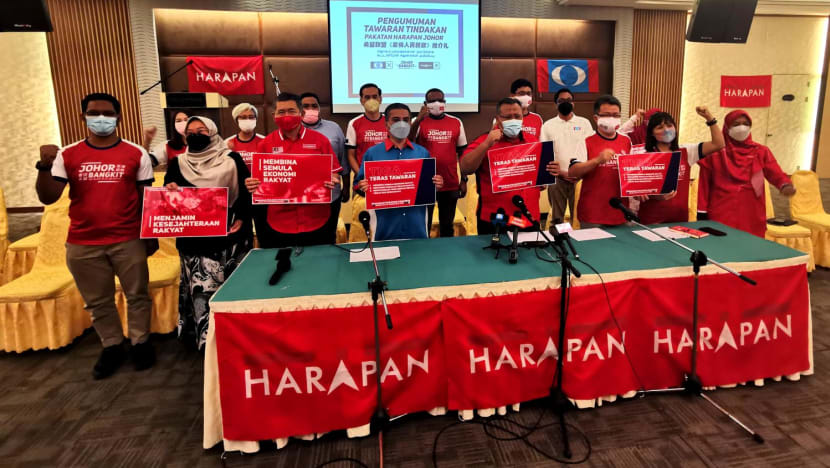PH pledges to rebuild Johor's economy amid COVID-19 impact in election manifesto
Echoing other parties contesting in the state polls, Pakatan Harapan has called for a full reopening of the Johor-Singapore borders.

Pakatan Harapan leaders in Johor unveiled the coalition's manifesto on Mar 4, 2022 during a press conference in Batu Pahat. (Photo: CNA/Amir Yusof)
BATU PAHAT, Johor: Pakatan Harapan (PH) launched its manifesto for the Johor state election on Friday (Mar 4), promising to attract investments and build a clean government.
The manifesto was launched during a press conference chaired by the Johor chiefs for Parti Keadilan Rakyat (PKR), Democratic Action Party (DAP) and Parti Amanah Negara (Amanah) - Syed Ibrahim Syed Noh, Liew Chin Tong and Aminolhuda Hassan respectively.
Among the other candidates who were present was Malaysian United Democratic Alliance (MUDA) secretary-general Amira Aisya Abd Aziz.
The PH manifesto was launched in line with the coalition’s slogan for the polls “Johor Bangkit: Maju, Bermaruah” or “Rise Johor: Forward with Dignity”.
It contained “offers” to voters along three main themes, namely rebuilding the economy, ensuring the people’s prosperity as well as ensuring a clean, efficient and dignified government.
A key focus was to help Johor’s economy recover from the ongoing impact of the COVID-19 pandemic.
To this end, PH pledged to push for the full reopening of the Johor-Singapore borders with a “test and release” scheme.
Mr Liew said this will allow Johoreans to travel to and fro every day, while adhering to protocols outlined by the health ministry.
“The reopening of borders will also accelerate the property market in Johor, which is currently facing an oversupply problem, especially homes priced at RM500,000 (US$119,000) and above,” he said.
Besides PH, MUDA and Perikatan Nasional (PN) have also called for the Johor-Singapore borders to be fully reopened.
Mr Liew added that PH aims to attract investment “strategically”, for industries which will offer quality jobs to local Johoreans.
“Our strategy is to aim for win-win projects with Singapore and Indonesia to increase foreign direct investments in the SIJORI (Singapore-Johor-Riau) growth triangle,” said Mr Liew.
The coalition also pledged to narrow development gaps across the different parts of Johor and to improve the public transport system in the Iskandar region.
Among the initiatives introduced to boost the prosperity of Johoreans, PH said it aims to offer tuition vouchers to primary and secondary school students who are part of the “lost generation”, having been forced to do online learning due to school closures as a result of COVID-19, said Mr Syed Ibrahim of PKR.
To ensure a clean government, PH pledged to enact an anti-hopping law in the Johor state assembly.
The coalition also promised to realign electoral boundaries for areas with dense voter population, and pledged to allocate the same annual funds for both government and opposition assemblymen.
When asked if the offers stated in the PH manifesto overlapped with similar pledges mentioned by the other parties in the election, the three leaders denied this.
Mr Liew explained that some of the pledges were implemented when PH ruled the Johor government between 2018 and 2020.
He said: “To promote politics with dignity, we had suggested institutional and political reforms which now have been used by both BN (Barisan Nasional) and PN. This includes the anti-hopping law … and the similar annual funds for assemblymen in both government and opposition.
“These were ideas introduced by PH back in 2018 and we see now that these parties have accepted this,” he added.
During the 2018 general election, PH won 30 of the 56 state seats in Johor, when Dr Mahathir Mohamad-led Parti Pribumi Bersatu Malaysia (Bersatu) was part of the coalition.
It was the first time in Malaysia’s history that Johor, considered a BN stronghold and bastion of the United Malays National Organisation (UMNO), fell to the opposition.
However, political manoeuvrings at the federal level, which saw Bersatu leaving PH in February 2020, eventually returned Johor to BN.
Before the dissolution of the state assembly in January, BN was governing Johor alongside PN, which comprises Bersatu and Parti Islam Se-Malaysia (PAS).
At that time. caretaker chief minister Hasni Mohammad argued that the state government needed a fresh mandate as it only held a slim majority following the death of former chief minister Osman Sapian in December last year.
Mr Hasni said that the election was necessary as the stability of the Johor state government was a prerequisite for investors and businesses to expand their operations in the state.
PH has been plagued by signs of disunity among the opposition parties in this state polls.
PKR decided to use its own logo for campaigning while Amanah and DAP are contesting under the PH umbrella.
PKR is contesting in 20 seats, while Amanah and DAP are contesting in 16 and 14 seats respectively.
MUDA, which is allied to PH, is contesting in seven seats. MUDA and PKR, however, have both decided to contest in Larkin, potentially splitting the votes.
More than 2.59 million voters are eligible to cast their ballot in this state election, with the Election Commission (EC) targeting a 70 per cent voter turnout.
Early voting will take place on Mar 8, while polling has been set for Mar 12.
There are 239 candidates contesting in all 56 state seats.
There will be seven three-cornered fights, 35 four-cornered fights, eight five-cornered fights, four six-cornered fights, and two seven-cornered fights.
















